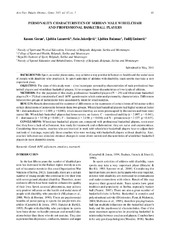Приказ основних података о документу
Personality characteristics of serbian male wheelchair and professional basketball players
Charakteristika osobnosti srbských basketbalistů-vozíčkářů a profesionálních basketbalistů
| dc.creator | Kasum, Goran | |
| dc.creator | Lazarević, Ljubiša | |
| dc.creator | Jakovljević, Saša | |
| dc.creator | Bačanac, Ljubica | |
| dc.creator | Eminović, Fadilj | |
| dc.date.accessioned | 2021-06-09T13:47:04Z | |
| dc.date.available | 2021-06-09T13:47:04Z | |
| dc.date.issued | 2012 | |
| dc.identifier.issn | 1212-1185 | |
| dc.identifier.uri | http://rfasper.fasper.bg.ac.rs/handle/123456789/572 | |
| dc.description.abstract | Background: Sport, as social phenomena, may achieve a very positive infl uence on health and the social state of people with disability who practice it. In sport activities of athletes with disability, team sports may take a very important place. Objective: The aims of this study were - a) to investigate personality characteristics of male professional basketball players and wheelchair basketball players, b) to compare these characteristics of two kinds of athletes. Methods: For the purposes of this study, professional basketball players (N = 29) and wheelchair basketball players (N = 25) had completed a Cattell 16PF questionnaire which estimated personality characteristics. Diff erences between two groups of participants were calculated by t-test for small samples. Results: Results demonstrated the existence of diff erences in the expression of certain forms of behaviour within certain dimensions of personality between these two groups. Wheelchair basketball players had higher scores at factor M - abstractedness (t = -1.889; p = 0.046), which means that they are more preoccupied by themselves and their inner mental life. Wheelchair basketball players had lower scores, on factors: C - emotional stability (t = 2.097; p = 0.041), E - dominance (t = 3.530; p = 0.001), F - liveliness (t = 2.658; p = 0.010) and N - privateness (t = 2.527; p = 0.015). Conclusions: Wheelchair basketball players are, compared with professional basketball players, more emotive; they have a lack of self-esteem, less ready for teamwork and collaboration; they are naive and unpretentious. Considering these results, coaches who are involved in work with wheelchair basketball players have to adjust their methods of trainings, especially those coaches who were working with basketball players without disability. Also, coaches' infl uence can stimulate eventual changes in some above mentioned characteristics of wheelchair basketball players in more desirable course. | en |
| dc.publisher | Palacky Univ | |
| dc.relation | info:eu-repo/grantAgreement/MESTD/Integrated and Interdisciplinary Research (IIR or III)/47015/RS// | |
| dc.rights | openAccess | |
| dc.rights.uri | https://creativecommons.org/licenses/by/4.0/ | |
| dc.source | Acta Universitatis Palackianae Olomucensis, Gymnica | |
| dc.subject | Cattell 16PF | en |
| dc.subject | Emotions | en |
| dc.subject | Self-esteem | en |
| dc.subject | Teamwork | en |
| dc.title | Personality characteristics of serbian male wheelchair and professional basketball players | en |
| dc.title | Charakteristika osobnosti srbských basketbalistů-vozíčkářů a profesionálních basketbalistů | sr |
| dc.type | article | |
| dc.rights.license | BY | |
| dc.citation.epage | 47 | |
| dc.citation.issue | 2 | |
| dc.citation.other | 42(2): 41-47 | |
| dc.citation.spage | 41 | |
| dc.citation.volume | 42 | |
| dc.identifier.doi | 10.5507/ag.2012.011 | |
| dc.identifier.fulltext | http://rfasper.fasper.bg.ac.rs/bitstream/id/506/569.pdf | |
| dc.identifier.scopus | 2-s2.0-84874293305 | |
| dc.type.version | publishedVersion |


